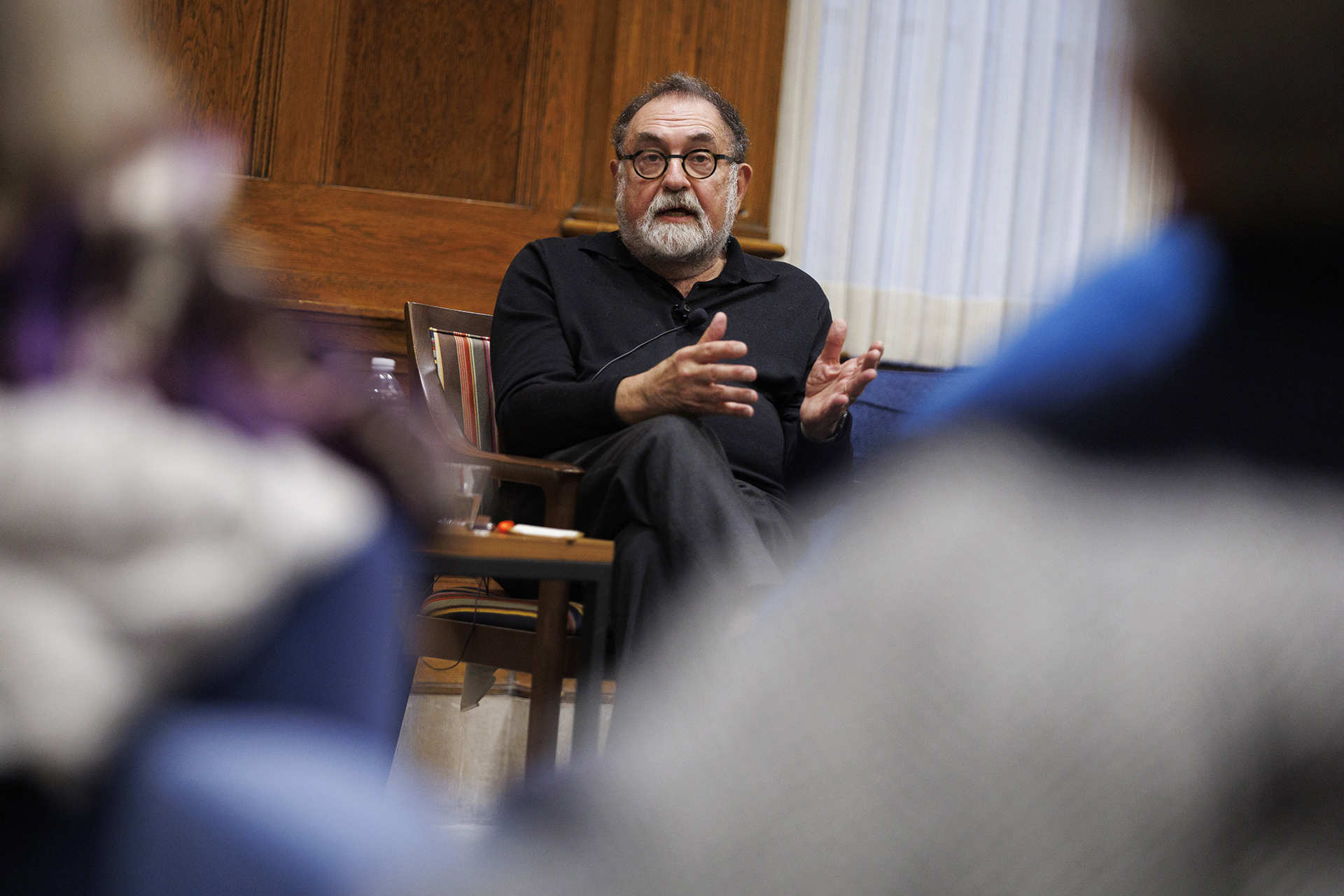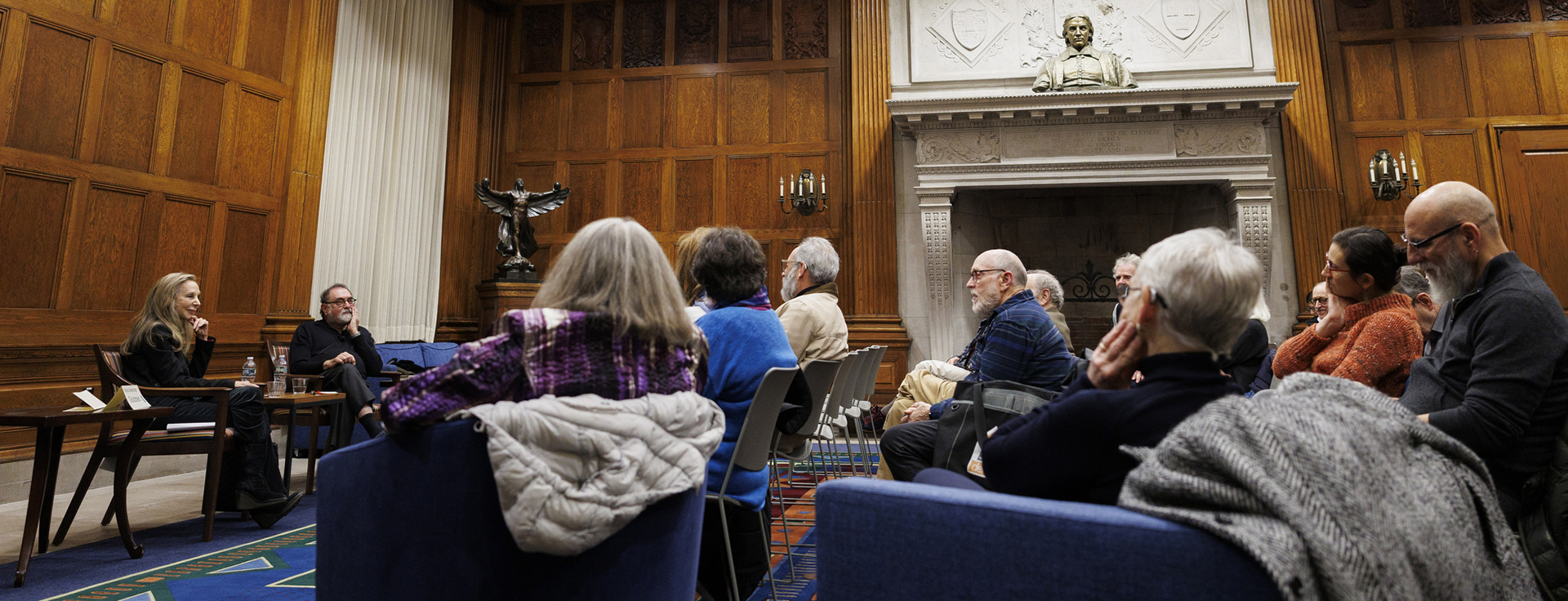‘Incredibly serious and unbelievably funny’
Philip Roth biographer, in Harvard talk, digs into novelist’s contradictions, ‘true loves,’ and recurring themes from lust to Jewish life

Steven J. Zipperstein speaks at Harvard about his new biography, “Philip Roth: Stung by Life.”
Photos by Stephanie Mitchell/Harvard Staff Photographer
Steven J. Zipperstein was on the verge of starting rabbinical school when he came across an early excerpt from Philip Roth’s trailblazing novel “Portnoy’s Complaint” about a young Jewish bachelor and his obsession with sex.
It was a reading that taught the young Zipperstein, who grew up in a Jewish Orthodox family in Los Angeles and was wrestling with cultural and religious expectations, crucial lessons about both the nature and the intricacies of freedom.
Zipperstein made a reference to the lasting impact of that early reading of “Portnoy’s Complaint” during a recent Harvard talk about his new biography, “Philip Roth: Stung by Life,” with Rebecca Goldstein, a MacArthur-winning writer of novels and nonfiction, and a research associate in the Department of Psychology. The event was co-sponsored by the Center for Jewish Studies at Harvard and the Jewish Cultures and Societies Seminar at the Mahindra Humanities Center.
“What I realized was that the book was not about the happy life of a libertine, but it was about someone with all the freedom in the world who was a neurotic,” said Zipperstein, the Daniel E. Koshland Professor in Jewish Culture and History at Stanford University.
“It taught me something about the world I was yearning to enter into. It taught me that if I was to leave orthodoxy, I was not entering panacea or utopia. His voice remained with me.”

Zipperstein left orthodoxy and became a historian of Judaism and Jewish culture and a longtime admirer of Roth for his “honesty to confront life,” for being both “an incredibly serious writer and unbelievably funny,” and for his relentless examination of the Jewish American experience. Zipperstein writes of Roth, “He would probe nearly every aspect of contemporary Jewish life: the passions of Jewish childhood, the pleasures and anguish of postwar Jewish suburbia, Israel, diaspora, the Holocaust, circumcision, the interplay between the nice Jewish boy and the turbulent one deep inside.”
A formidable and prolific author who won numerous literary awards, Roth wrote 31 books, among them “Goodbye, Columbus,” “The Ghost Writer,” “The Plot Against America,” “American Pastoral,” “I Married a Communist,” and “The Human Stain.” When Roth died in 2018 at age 85, he was described in a New York Times obituary as a “pre-eminent figure in 20th-century literature,” and a “towering novelist who explored lust, Jewish life and America.”
Around the time when Zipperstein’s biography on writer Isaac Rosenfeld came out, Roth reached out to Zipperstein saying that he was on a “quest to find a biographer,” said Zipperstein. In 2021, a biography of Roth authored by Blake Bailey was quickly pulled from publication in the wake of accusations of sexual misconduct against Bailey. After that, there was a need for a new biographical study of Roth, Zipperstein wrote in his book, “all the more so since few contemporary writers have shown themselves to be quite as self-referential as Roth, and few self-referential writers have managed, for so very long, to be quite cagey, so slippery.”
Zipperstein’s book, which published in October, draws from interviews with more than 100 friends and family members, dozens of archival materials, and conversations with Roth himself about his life and work.
“He decided sometime in his 20s that he was going to be as great a writer as Melville, and I think he felt that there wasn’t a whole lot of discretionary time for emotional involvement.”
“One of the reasons why he trusted me is that he knew that I really loved his prose, and that I was going to write a book that centered around his prose, because that’s really all he cared about,” said Zipperstein. “I never tired of reading his work.”
Asked about how he came to terms with the accusations of misogyny against Roth, Zipperstein said Roth avoided emotional ties with women and even male friends because he put more time and energy in writing his books than in any human relationship.
“He decided sometime in his 20s that he was going to be as great a writer as Melville, and I think he felt that there wasn’t a whole lot of discretionary time for emotional involvement,” said Zipperstein. “He was involved romantically with several extraordinary women, but as one of them told me, ‘As soon as we began to demonstrate needs, he disappeared.’”
In writing a biography built on the interaction between Roth’s life and his work, Zipperstein said he approached the endeavor without the need to reconcile the writer’s contradictions.
“He was someone who took offense so quickly, and yet he took incredible fictional risks,” said Zipperstein. “I was surprised by the extent to which he extended himself for friends but not to his close family. I ended up being probably closer to first cousins of his than he was. And yet, he built book after book around family. How do I reconcile that with his indifference to most of his relatives? I can’t, but one doesn’t have to reconcile everything in biography.”
In the end, Roth’s true devotion was to his craft, said Zipperstein. As he writes in his biography, “There was nothing of greater importance to Roth than his books, his true loves, and that is the only reason that justifies spending years of one’s own life writing and rewriting a book about him.”




